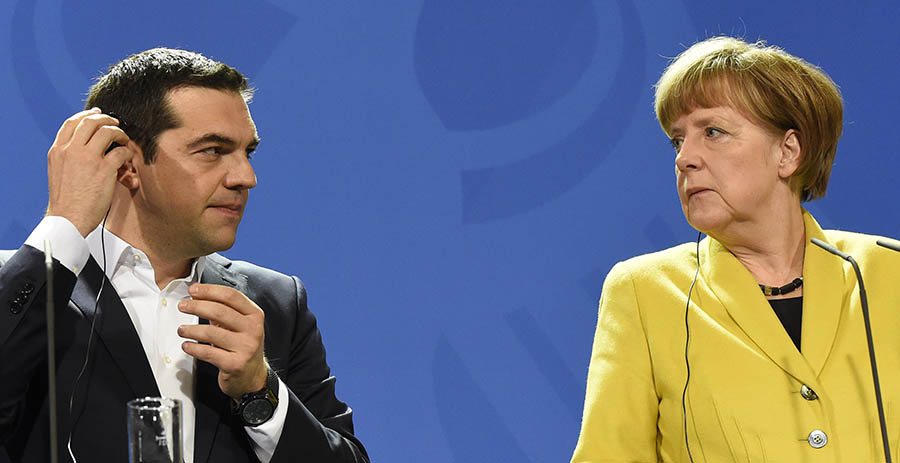
German Chancellor Angela Merkel has warned there must be a deal between Greece and its creditors ahead of Monday’s emergency EU summit.Otherwise, she said, the summit would not be able to make any decision.
Greece has less than two weeks remaining to strike a deal or face defaulting on a €1.6bn (£1.1bn) IMF loan repayment.
There are fears about the health of Greek banks, amid reports more than €4bn has been withdrawn this week.
On Friday, the European Central Bank (ECB) approved more emergency help for the banks. The amount of extra funding has not been officially disclosed.
Meanwhile, Russia says that it will consider granting a loan to Greece if it is asked.
If Greece fails to make the repayment due to the International Monetary Fund, it risks having to leave the eurozone and possibly also the EU.
The European Commission, the IMF and the ECB are unwilling to unlock bailout funds until Greece agrees to reforms.
They want Greece to implement a series of economic changes in areas such as pensions, VAT and on the budget surplus before releasing €7.2bn of funds, which have been delayed since February.
‘Expectations’
The emergency summit of leaders from eurozone nations will be held in Brussels on Monday, after negotiations on Thursday failed.
“Let me make it very clear as to the expectations,” Mrs Merkel said on Friday.
“Such a summit can only become a summit of decisions if there is something to base a decision on.
“It is up to the three institutions [the ECB, IMF and European Commission] to assess this, and up to now we don’t have that assessment.”
Valdis Dombrovksis, European Commissioner for the euro, told BBC Radio 4’s Today programme that there had been “a strong signal” from the Eurogroup to Greece “that it’s [the] last moment to engage seriously in negotiations”.
Responding to the reports of big cash withdrawals by Greek savers, he said: “It’s very clear that one of the most urgent things Greece needs is financial stability.”
‘Quiet withdrawals’
The Reuters news agency said withdrawals by Greek savers between Monday and Friday reached about €4.2bn, which represents about 3% of household and corporate deposits held by Greek banks at the end of April.
Close to €1bn was withdrawn on Friday alone, the financial website Euro2day said.
“There are no lines [queues] or panic, it has been a quiet and gradual phase of withdrawals,” one banker told Reuters.
A fully fledged run on the banks could upset the plans of the Greek government and its creditors, says BBC Europe correspondent Chris Morris.
He says that any introduction of capital controls will depend on the behaviour of the Greek people.
He says that if the outflow of deposits from banks reaches alarming levels which no-one can really cope with, then the decision is taken out of policymakers’ hands.
Greece – deal or no deal?
- Option 1: No deal: Greece defaults on IMF and ECB repayments; ECB pulls plug on emergency bank assistance leading to run on Greek banks, capital controls and potential Grexit
- Option 2: Greece agrees reform deal with creditors at last minute and avoids default, staying in euro
- Option 3: No deal reached but both sides paper over cracks and Greece stays in euro for now
Cars and shoe boxes: Greeks cope with an economic crisis
Peston: Is there any way Greece can avoid default??
Walker: The options for Greece
What impact would Grexit have on UK?
Greece debt crisis: Full coverage
Greek Prime Minister Alexis Tsipras said on Friday that there would be a solution to Greece’s debt crisis.
“The [eurozone] leaders summit on Monday is a positive development on the road toward a deal,” Mr Tsipras said in a statement.
“All those who are betting on crisis and terror scenarios will be proven wrong.”
He added: “There will be a solution based on respecting EU rules and democracy which would allow Greece to return to growth in the euro.”
Mr Tsipras was at an economic forum in St Petersburg in Russia on Friday with a delegation of ministers and business leaders.
At the forum, Greece and Russia signed a memorandum on extending the planned Turkish Stream gas pipeline to Europe through Greek territory.
Athens said funding would come from Russian state development bank VEB.
Greek Energy Minister Panagiotis Lafazanis said at the signing ceremony that Greece needed support and not pressure, and that co-operation with Russia was not aimed against other countries or Europe.
President Vladimir Putin’s spokesman, Dmitry Peskov, said Russia would consider granting Greece a loan.
But the issue was not raised in talks between Mr Putin and Mr Tsipras, he said.
Greek debt talks: main sticking points
- Greece will not accept cuts to pension payments or public sector wages, saying two-thirds of pensioners are either below or near the poverty line
- International creditors want pension spending cut by 1% of GDP – it accounts for 16% of Greek GDP. They say their target is early retirement not individual pensions
- EU officials say Greece has agreed to budget surplus targets of 1% of GDP this year, followed by 2% in 2016 and 3.5% by 2018. Greece says nothing is agreed until everything is agreed
- Creditors also want a wider VAT base; Greece says it will not allow extra VAT on medicines or electricity bills
- Greece complains creditors focus on increasing taxes instead of cracking down on tax evasion; IMF is concerned Athens is not offering credible reforms
